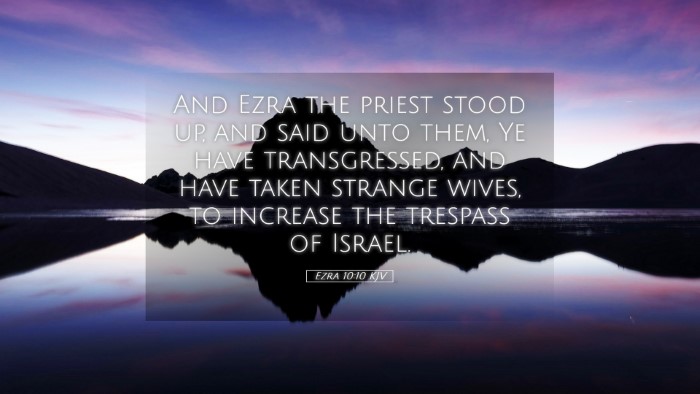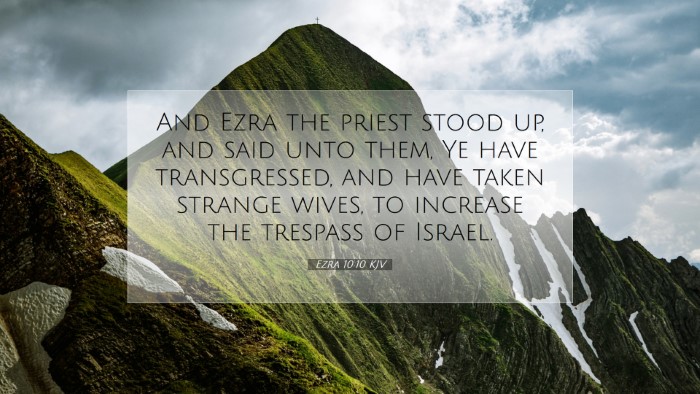Commentary on Ezra 10:10
Introduction
Ezra 10:10 presents a significant moment in the history of Israel, where the community faces the dire consequences of intermarriage with foreign nations. This passage serves as both a historical account and a spiritual admonition. The weight of sin and the call for repentance are central themes that resonate throughout scripture. The insights drawn from public domain commentaries will delve into the implications of Ezra's actions and the broader theological lessons for God's people.
Verse Context
The verse states: "And Ezra the priest stood up, and said unto them, Ye have transgressed, and have taken strange wives, to increase the sin of Israel." This statement follows a period of mourning and prayer, revealing Ezra's profound concern for the purity of the Israelite community.
Insights from Matthew Henry
According to Matthew Henry, the sin addressed by Ezra is twofold: it is both a personal transgression and a communal infraction. He highlights the importance of addressing sin "by persuasion rather than by persecution." Ezra’s call for action is not merely about enforcing the law but about leading the people back to a covenant relationship with God. This reflects a pastoral heartbeat that resonates with the longing for restoration.
Henry emphasizes the following points:
- Recognition of Sin: Ezra acknowledges the gravity of their actions while calling on them to confess and repent.
- Consequences of Intermarriage: He outlines the dangers of mingling with foreign nations which could lead to idolatry and compromise the faith of Israel.
- Community Responsibility: Ezra's concern is not only for individual souls but for the health of the entire nation.
Insights from Albert Barnes
Albert Barnes provides a detailed examination of the implications of Ezra's condemnation of intermarriage. He notes that the Israelites had entered into relationships that were forbidden by the Law of Moses, and this act symbolizes a broader unfaithfulness to God. Barnes articulates that such unions would lead to the dilution of their identity and worship practices.
Barnes draws attention to:
- Theological Significance: Intermarriage is not simply a matter of ethnic purity but directly impacts Israel's worship and relationship with God.
- Call for Accountability: Ezra’s declaration acts as a charge for solidarity among the people, compelling them to consider their actions in light of divine standards.
- The Nature of Repentance: Repentance is portrayed as a communal exercise, and Ezra facilitates this process with a spirit of humility and prayer.
Insights from Adam Clarke
Adam Clarke offers a more detailed socio-historical background, noting how the foreign wives were not merely a racial concern but indicated a profound shift away from the covenantal instructions given to Israel. Clarke emphasizes the socio-political context of Ezra's time, where intermarriage posed real threats to religious integrity and community cohesion.
Clarke articulates several key observations:
- The Historical Reality: This moment is set against the backdrop of a returning remnant struggling to rebuild both their identity and their temple.
- Divine Expectation: God's expectations of His people are demonstrated in His command for them to remain separate from influences that stray from His covenant.
- Urgency of Reform: Clarke notes Ezra’s impassioned plea as critical for the spiritual revival necessary for the restoration of Israel.
Theological Implications
As we reflect on Ezra 10:10, several theological implications arise:
- The Nature of Sin: Sin is portrayed not just as individual actions but as a broader relational disobedience to God’s covenant.
- Community and Identity: The identity of God's people is linked to their faithfulness to God’s commands, and intermarriage signifies a potential loss of that identity.
- Repentance and Restoration: The call to repentance is a recurring theme throughout scripture, urging the faithful to turn back to God and seek restoration.
- God’s Holiness: The holiness of God requires that His people maintain purity in their worship and relationships, reflecting His character.
Application for Today
Pastors, students, and scholars can draw several applications from this text:
- Examine Relationships: Reflect on the influences that surround our lives and evaluate them against the teachings of scripture.
- Community Responsibility: Consider how the actions of individuals can impact the broader faith community and seek to foster an environment of accountability.
- Importance of Teaching: Emphasize teaching on the nature of sin and the beauty of restoration through repentance.
- Prayer and Confession: Encourage a culture of prayer, confession, and communal support for those striving to live faithfully before God.
Conclusion
Ezra 10:10 captures a pivotal moment in Israel's religious life, underscoring the necessity of faithfulness to God amidst cultural pressures. The insights from Matthew Henry, Albert Barnes, and Adam Clarke offer a rich tapestry of understanding that not only encompasses the historical context but also challenges contemporary believers to pursue holiness. As we engage with this passage, let us be reminded of our calling to remain steadfast in our allegiance to God and His ways, both individually and as a community.


